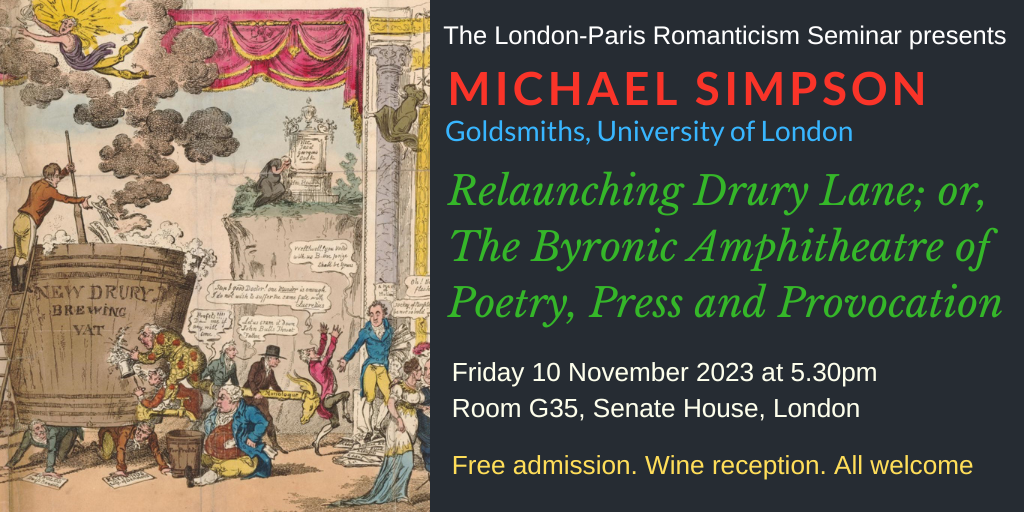
The next meeting of the London-Paris Romanticism Seminar will take place on Friday 10 November 2023 in the Bloomsbury Room (G35, ground floor), Senate House, University of London, starting at 5.30pm. As our distinguished speaker, we are delighted to present Dr Michael Simpson of Goldsmiths, University of London, who will deliver a paper entitled Relaunching Drury Lane; or, The Byronic Amphitheatre of Poetry, Press and Provocation. This will be followed by a discussion and wine reception. The seminar will be chaired by David Duff.
The event is free and open to everyone, including postgraduates and members of the public. No booking is required.
Michael Simpson is Distinguished Visiting Research Fellow in the Research Centre for Comparative Literature at Goldsmiths, University of London. He has published widely across the fields of British Romantic studies and Classical Reception studies. He is currently completing a monograph titled ‘Lost Plots: Romanticism and the Distractions of Reading’ and is the author of a chapter on ‘Byron and Theatre’ in the forthcoming Oxford Handbook of Lord Byron. Previous publications include Closet Performances: Political Exhibition and Prohibition in the Dramas of Byron and Shelley (1998), and articles and essays on Romantic theatre, lyric poetry, and the novel. His work on Classical Reception includes co-edited volumes on Classicising Crisis: The Modern Age of Revolutions and the Greco-Roman Repertoire (2021) and Thinking the Olympics: The Classical Tradition and the Modern Games (2011). He has held research fellowships in the Program in British Studies at the University of Texas at Austin and in the Institute for Research in the Humanities at the University of Wisconsin, Madison.
Regarding the subject of his paper, Michael writes:
‘Masterminding a smoothly triumphal relaunching of a newly rebuilt Drury Lane theatre in 1812, following a devastating fire, the new management planned a production of Hamlet and arranged a public competition to select the ceremonial address for the inauguration. Management sought to avoid both another theatre fire and a theatre riot, as had recently occurred at Covent Garden. But the competition was cancelled after none of over a hundred submissions was judged satisfactory. A quick fix involved the commissioning of a reluctant Lord Byron to provide the needed address. Meanwhile, the Tory press alleged that the entire project was a Whig attempt to appropriate the national drama and national poet Shakespeare to a new, partisan cultural ascendancy. The resulting ferment in Drury Lane was neither a fire nor quite a riot, but a roiling mix of metatheatrical farce and printed parody. My paper argues that among the many recycled elements here is an emerging pattern of a Byronic poetic text creating a ‘bubble’ of attention and productivity which it absorbs, boosts and shapes in a subsequent text or instalment. In this case, Byron’s poetical Address, Spoken at the Opening of Drury-lane Theatre and especially his following Parenthetical Address, by Dr Plagiary conjure a bubble resembling a symbolic amphitheatre, straddling stage and press, within which relevant preceding, and potentially succeeding, events, texts, and prints are framed, not as a mere messy eventfulness, nor a neat Whiggish plot, but as an ensemble of revealed commercial behaviours.’